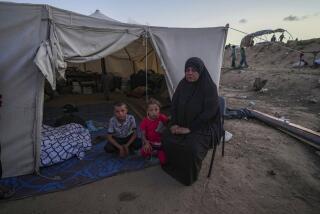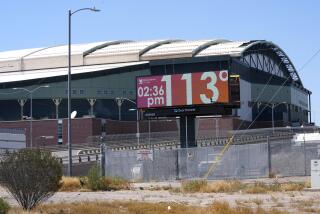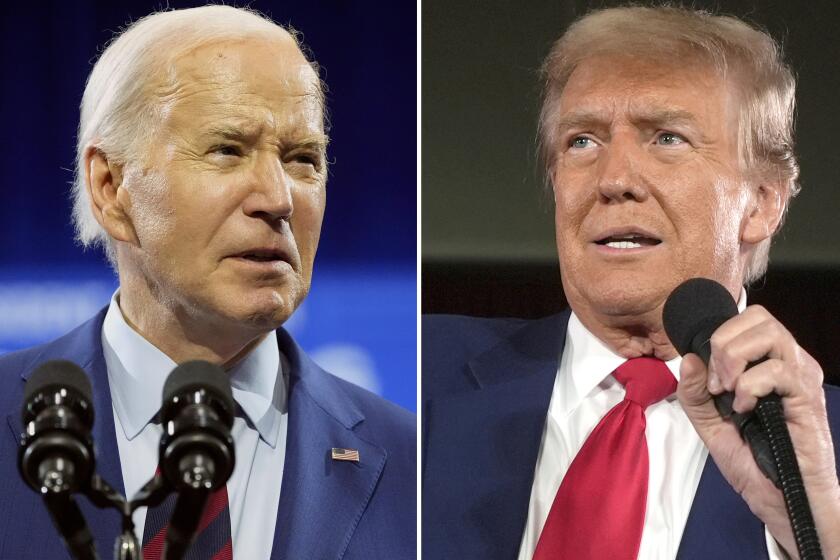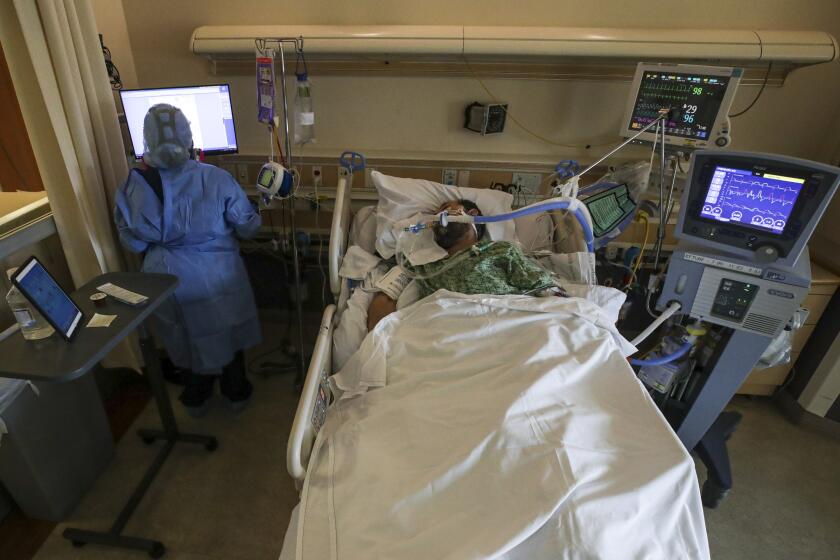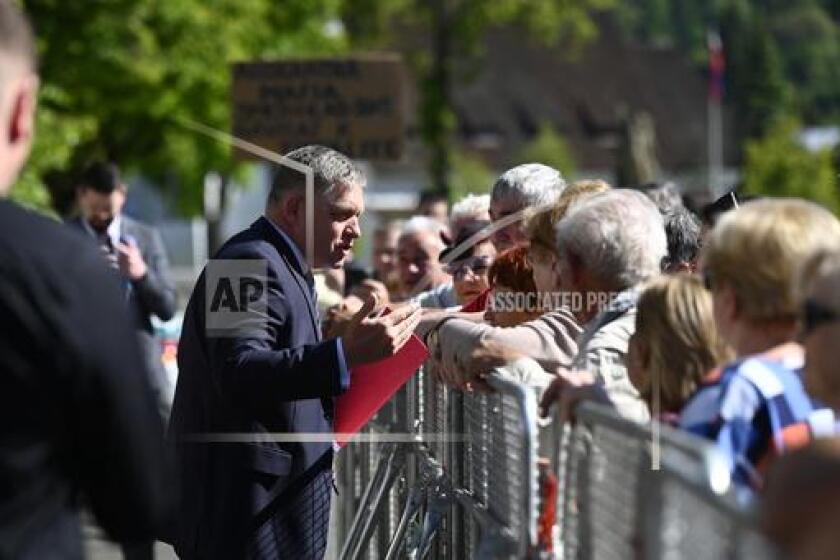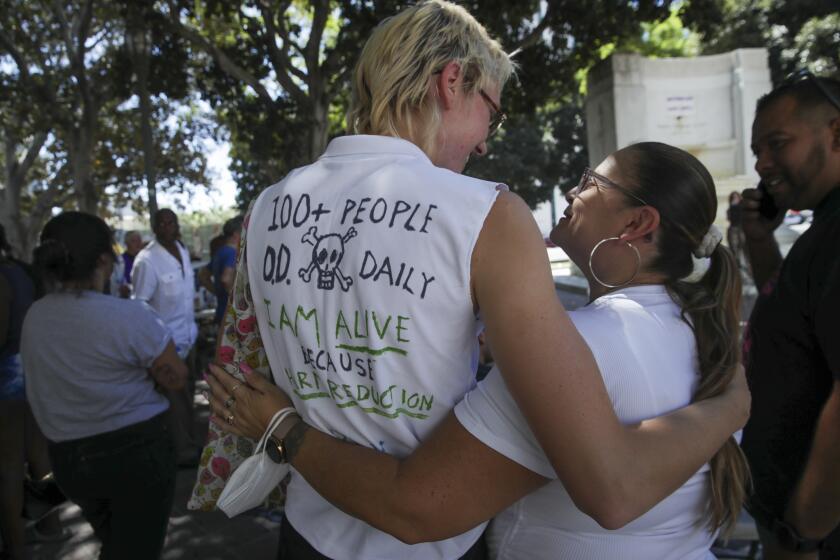ISRAEL UNDER SIEGE : Hamas’ Fluid Support Makes It Tough Target
When Asad Hassouneh ran for election as president of the Ramallah Chamber of Commerce a few years ago on a slate called “Islam Is the Solution,” it was generally acknowledged that he was a candidate for Hamas. And he won.
Today, Hassouneh sits at his desk in front of a photograph of himself with the newly elected Palestinian Authority president, Yasser Arafat, and maintains that he never belonged to Hamas.
Probably he did not--which is precisely why Hassouneh is so representative of Hamas followers.
Hamas is not a club of card-carrying members who pay dues but an Islamic political movement whose fellowship ebbs and flows with the mood in the streets of Palestinian cities and villages.
After four Hamas suicide bombings took at least 61 lives in nine days, Israelis cried out for their government and Arafat’s to take apart Hamas. Israeli Prime Minister Shimon Peres set up an emergency task force with a no-holds-barred mandate to fight the Islamic terrorists.
But Gen. Ami Ayalon, chief of Israel’s General Security Service, or Shin Bet, and the man in charge of the operation, acknowledged the difficulties of the job at hand.
“Hamas is an idea, not an organization,” Ayalon said.
Hamas has a military force but also a broad infrastructure of social and educational services, a few of which Israeli soldiers shut down on Tuesday. Ayalon noted that Hamas religious leaders are deeply entrenched among the Palestinian people and that their message is spread through charities, health care centers and schools as well as mosques.
The Hamas name does not appear over the door of these social projects. The Islamic political group was illegal under Israeli occupation, and its relations with Arafat’s Palestinian Authority have been tense. But in most West Bank and Gaza Strip communities, it is an open secret which schools or health centers are financed by Hamas.
“There is no school or nursery of Hamas,” insisted Hassouneh. “What you have are schools that come under the Islamic Society. People who are conservative or pious want their children to attend because they are run according to Islamic teaching. It might be that an employee or students have a certain direction, but you can’t say it is Hamas.”
Israeli officials do, however, assert that Hamas has seven schools in Hebron, four in Ramallah and four in Nablus, and that it controls student councils in all West Bank colleges and universities, with the exception of Bethlehem’s.
Several Islamic colleges and trade schools were shut down in Abu Dis, near East Jerusalem, and in Hebron on Tuesday. Arafat’s police raided a teachers college in Ramallah after Sunday’s bus bombing in Jerusalem, arresting dozens of students, including one who Arafat claimed was the recruiter of the suicide bombers in the two Jerusalem attacks.
A senior Israeli military officer who has spent the past four years following Hamas said he believes that the loosely knit organization channels 95% of its resources into civilian activities and only 5% into the military wing. Israelis have never been able to establish a money trail between the social institutions and the military wing, though they believe there is one.
An offshoot of the Muslim Brotherhood, Hamas was born in 1988, soon after the beginning of the intifada, or Palestinian uprising against Israeli occupation. Initially, it was given tacit support by Israel, which at the time wanted to nurture a seemingly benign alternative to Arafat’s Palestine Liberation Organization.
The goal of Hamas, however, is to convince people to follow the laws and traditions of Islam and, eventually, to set up an Islamic state of Palestine on the model of Iran. It wants that state to consist of all of the former Palestine--Gaza, the West Bank and Israel itself.
Hamas leaders oppose Arafat because they believe that he has cut a shoddy deal with what they view as the Zionist devil. They reject his land-for-peace agreement, which has put only Gaza and part of the West Bank under Palestinian rule and does not recognize Palestinian statehood or a Palestinian capital in Jerusalem.
The size of Hamas’ social base is difficult to quantify, in part because it fluctuates. But while most Palestinians share the vision of an independent state, only a minority supports Hamas and apparently even fewer back the current campaign of suicide bombings.
The Hamas military wing’s disregard for this public opinion is a shift that contributes to political analysts’ confusion over the current terrorist campaign.
“Apart from these attacks, Hamas would pay attention to the mood,” said Ziad abu Amr, an authority on Islamic fundamentalism and a member of the newly elected Palestinian legislative council. “Certain military attacks were heartily supported by Hamas [followers] when they felt they were justified.”
Now, Abu Amr said, “I think there must be a breakdown in the hierarchy.”
The publicly stated opposition of Hamas political leaders inside Gaza and the West Bank to the terrorist campaign lends support to the view that there is a split in the movement. So does the fact that twice Hamas issued leaflets offering a cease-fire, only to have more bombings follow.
A third such leaflet was released Tuesday, saying that the Iziddin al-Qassam military wing of Hamas would heed the call of the movement’s political leaders and halt suicide bombings until July if Israel agreed not to attack its activists.
It added the disclaimer that Iziddin al-Qassam could no longer be held responsible for “any action carried out inside the state of the Zionist entity.” Hamas has a loosely knit military structure, without a single chain of command, and this statement led to further debate about the nature of possible splits within Hamas.
Menachem Klein, an expert on Hamas at the BESA Center for Strategic Studies at Bar Ilan University, wrote in the daily newspaper Yediot Aharonot that there are three streams in Hamas: “One is a pragmatic stream which has tried to turn Hamas into a political organization. The second is comprised of radicals who have called for the continuation of the struggle against Israel which was waged in the past. The third stream tried to strike a balance between these two polar extremes.”
Hamas initially said the latest bus bombings were in reprisal for the assassination of Yehiya Ayash, its top bomb maker. He was killed by an exploding cellular phone Jan. 5 in an operation widely believed to have been carried out by Israeli security forces.
But as the wave of bombings continued, political analysts dismissed that view and speculated that it was a drive to bring down the peace process.
“I really think it will be some time before we find out what exactly is behind this eruption of violence. The scale is unprecedented,” Abu Amr said.
More to Read
Start your day right
Sign up for Essential California for news, features and recommendations from the L.A. Times and beyond in your inbox six days a week.
You may occasionally receive promotional content from the Los Angeles Times.
